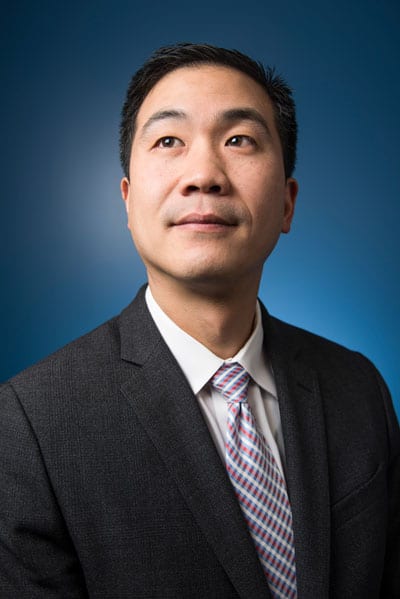Peter Kung joined SCL Health System—a faith-based, nonprofit healthcare organization with coordinated care through eleven hospitals and more than one hundred physician clinics with other comprehensive health services, primarily in Colorado and Montana—as system vice president of innovation and virtual health in 2015. He continued a legacy established by the Sisters of Charity of Leavenworth by improving the health of people and communities, especially the poor and vulnerable. Today, however, the new frontier in healthcare encompasses an industry undergoing transformation that provides Kung and his team an opportunity to bridge the gap between innovation and operations and accelerate SCL Health’s strategic growth.
SCL Health’s senior leadership charged the innovation and virtual health team with identifying, developing, and deploying high-impact ventures that improve access and experience for the people and communities they serve.
“We have focused our creativity, agility, and capability for high-velocity decision-making toward delivering high-value, people-centered innovations,” says Kung.

To reach those objectives, Kung is developing an internal innovations framework that follows a disciplined approach. One of his strategies has been contextualizing a quote from Jonathan Fields: “ritualize the mundane to make room for the brilliant.” In this vein, Kung and the team have streamlined rudimentary, but necessary, elements, such as discovery, process, and governance so they have capacity and freedom to operate in nontraditional ways.
Additionally, Kung and his team continually work toward supporting SCL Health’s strategic priorities, empower employees to deliver new value to their communities, and build creative confidence across their ministry. Associates are able to innovate reliably and repeatedly over time, filtering ideas and opportunities, evaluating alignment with other strategic priorities, and creating business cases for senior leadership.
“Having all the pieces in place creates rigor and efficiency in the innovation process and makes productive results repeatable and reliable,” Kung says. “The framework empowers staff and encourages them to view a range of issues from fresh perspectives. It also supports higher probability of success on impact and scope.”
SCL Health tested the approach this spring. Nearly three hundred valid ideas suggested how to create the ideal patient journey, both within and outside the hospitals and clinics. The organization awarded funds and sponsorships to eleven outstanding teams that have since executed their ideas and reported results in early 2018 to senior leadership.
Within the team’s portfolio, SCL Health has already launched eight different enterprise-wide initiatives along with many targeted innovations, all of which have contributed to a seamless patient experience and enhanced access. Two highlights include a collaboration with J2 Interactive, in which they customized a customer relationship management (CRM) platform to support SCL Health’s Meds-to-Beds service—an interactive application that integrates outpatient pharmacy at the hospital with EHRs to enable pharmacists to get medications to patients before they discharge. In addition, the service creates the opportunity to educate patients on proper medication instructions and compliance. Patients can also use the platform to submit questions after they leave the hospital.
The second highlight is CareShare, which also uses the CRM platform to assist coordination between postacute providers after discharge. Care navigators can easily see who needs additional assistance and use the platform to automate communications with multiple care teams.
SCL Health’s innovations also include efforts in the social determinants of health. Their recent collaboration with ridesharing company Lyft provides nonemergency transportation services to patients facing transportation barriers.
“Many of the patients we serve rely on public transportation, which can make accessing medical care challenging,” Kung says. “Helping patients get to or from our clinics and hospitals is a simple and critical step in improving health outcomes.”
The SCL Health team focuses on developing innovations that service real-world issues, and avoids what Kung refers to as the “ivory tower effect” in which one of two dynamics occur: innovation either becomes too far removed from the organization’s ongoing experiences and opportunities, or it is so close to ongoing activities that changes are incremental and could have eventually occurred within the evolution of normal operations.
Kung believes that SCL Health has been able to find the sweet spot for innovation. Solutions have been far enough from core operations to be different, and practical enough that their value is easy to see.
For example, SCL Health has partnered with Lantern, a mobile-based cognitive behavioral therapy program through which users are paired with health coaches to address stress, anxiety, and depression. SCL Health offers the program through its community benefit arm to underserved populations, while it is also offered as an employee benefit. After using Lantern for one month, 78 percent of Lantern users saw clinically meaningful outcomes in their symptoms. Among individuals with clinical levels of symptom severity, symptoms were reduced by 31 percent.
Within the behavioral and mental health service lines, the innovation and virtual health team also initially deployed telepsychiatry capabilities within two of its hospitals. This will help better utilize scarce resources and make care available more quickly, Kung says.
SCL Health continually pushes the envelope to improve the health of its patients, both within and outside its hospitals and clinics.
“In order to create meaningful change, we need to reimagine our work in ways that push beyond what we already know and may completely change the game,” said Kung. “People interact with health systems differently than they used to. Ultimately, it is our goal to create impactful and sustainable innovations that deliver value and the best experience to those who matter most—our patients.”
Photos by Paul H. Trantow
Healthcare IT innovators like SCL Health’s Peter Kung have increased patient engagement, reduced readmissions, and improved their bottom line with J2 Interactive’s post-discharge applications, including Care Share and Meds-to-Beds. To learn how J2 can help your organization deliver better health outcomes for your patients, drop us a line at: info@j2interactive.com


